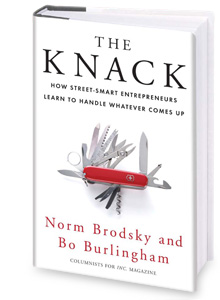People starting out in business tend to seek step-by-step formulas or specific rules for success, but in reality there are no magic bullets. Rather, says veteran company-builder Norm Brodsky, there's a mentality that helps street-smart entrepreneurs solve problems and pursue opportunities as they arise. He calls it "the knack," and it has made all the difference to the eight successful start-ups of his career.
 Brodsky explores this mind-set every month in Inc. magazine, in the hugely popular column he co-writes with journalist and author Bo Burlingham (best known for his acclaimed book Small Giants). In both their column and now their book, they tell stories about real companies facing real challenges and show readers how to apply "the knack" to their own businesses.
Brodsky explores this mind-set every month in Inc. magazine, in the hugely popular column he co-writes with journalist and author Bo Burlingham (best known for his acclaimed book Small Giants). In both their column and now their book, they tell stories about real companies facing real challenges and show readers how to apply "the knack" to their own businesses.
Among the morsels of business wisdom you will find here:
- Numbers run a business. If you don't know how to read them, you're flying blind.—Start tracking them by hand as soon as you launch your business.
- A sale isn't a sale until you collect.—A receivable is like a loan. Make sure your customers are credit-worthy.
- When your short-term liabilities exceed your short-term assets, you're bankrupt.—Keep track of how much you're going to collect and spend in the next twelve months.
- Forget about shortcuts. Run a business as if it's forever.—In the long run, your shortcuts will prove to be detours on the road to achieving your goals.
- Cash is hard to get and easy to spend.—Make it before you spend it.
- You have no friends in business, only associates.—You can laugh and cry with your employees, but neither you nor they should forget that it's a business relationship.
- Gross margin is the most important number on the income statement.—Don't make the mistake of focusing on the top line.
- Identify your true competitors, and treat them with respect.—Their opinion of you will play a critical role in determining your reputation.
- Culture drives a company.—The boss's most important job is to define and enforce it.
- The life plan has to come before the business plan.—You need to figure out where you want to go before deciding how to get there.
Brodsky and Burlingham prove that street smarts and business acumen can be within any entrepreneur's reach.
